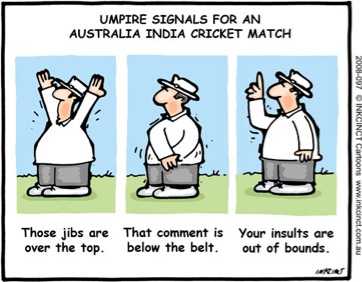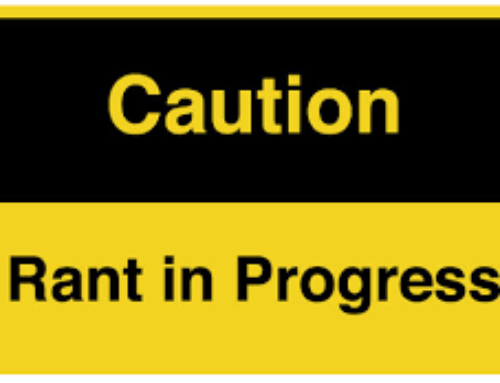Most Umpires in Cricket stand NOT for the money (very few qualify for, or are offered remuneration) but because they enjoy the game and want to help a match take place in a sensible, safe, and controlled environment. Very few proper Umpires are really incompetent, or cheats, and those that are, and do travel regularly with Clubs/Teams, will soon find that their repeat fixture invitations are reduced and/or that they receive some telling communication from their league organisers.
So, how to best influence an Umpire to your advantage – or at least ensure you get a “fair” crack of the whip!
I suppose that we can immediately split the “attempted influencing” and also the “inadvertent influencing” into two categories, “Team behaviour” and “Personal behaviour”. All Umpires are human, and even the most thick-skinned will become tired and irritated by irksome team “Umpire intimidation” tactics, and particularly by any personal abuse/bad behaviour exhibited by unhappy players. Such abuse can only be interpreted as trying to make the Umpire look foolish or incompetent. Being human, Umpires make the occasional mistake, and as Cricket players we all know that Cricket is a game where the match outcome is often/always determined by personal mistakes – most often those of bowlers or batsmen, but sometimes Umpires! If you cannot tolerate instances of mistakes occurring without becoming unpleasant, or unreasonably angry, then Cricket is surely not the game for you!
Team behaviour is, or ought to be, controlled/managed by the Captain. As with football players always claiming a “throw in” is “their ball” in professional football, some Cricket teams scream ridiculously for LBW on every occasion the ball hits a pad. Do they really think this is effective? Is the Umpire so weak and pliant that he is going to capitulate to the repetitive and usually barely merited, often increasingly exaggerated, and sometimes even repeated, appeals? On the other hand, is the Umpire, his afternoon made less pleasant by unnecessary cacophony and attempted intimidation, more likely to just switch off and just think – “you stupid b******** get nothing”! It’s a matter of opinion – but I know what mine is!
Personal dissent, or bad behaviour, is of course something else. As a bowler you are in a very weak position if you start abusing or showing off at an Umpire when you don’t get an LBW decision or get “Wided” or “No Balled”! The decision maker made an enemy of – very intelligent!! However, a polite and pleasant aside after a close decision turned down of “that must have been very close Umpire” and he might just think that he almost owes you one!
As for a batsman standing his ground after an LBW, or wildly abusing/and or gesticulating after being given out in some adjudicated manner, then possibly marching off the pitch, striking innocent water bottles or benches or changing room doors, all this designed to reinforce that impression to watchers that the Umpire is an incompetent idiot and has made a huge mistake. Is this likely to make the Umpire feel much more sympathetic to you and your team? I think not! If you are bowling and fielding second then also look forward NOT to the equalising error, but to the possibility of revenge served cold as marginal decisions fail to be given in your favour!
By and large Umpires tend to be “Older” (and wiser!) Cricketers/Ex-Cricketers, and, in the main, come from an age when the game was played in a more genteel and sporting manner (even at the higher levels). They expect courtesy and good manners as a “given”, and will be strong believers in the “Spirit of Cricket”.
If necessary wise up and do yourselves a favour!
It really doesn’t pay to irritate or upset the man, or men, in White Coats who can tip the balance in a match!!
(This Weekly column is written by John Heslam Club Chairman of Reed Cricket Club. The views expressed in the article are his own and do not necessarily comprise those of the Clubs General Committee)




